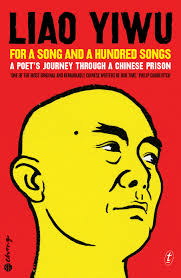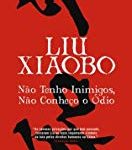 Writer and human rights advocate Liao Yiwu says the US president’s trade war with China may have helped Liu Xia, the widow of Nobel laureate Liu Xiaobo, win her release, The South China Morning Post reports.
Writer and human rights advocate Liao Yiwu says the US president’s trade war with China may have helped Liu Xia, the widow of Nobel laureate Liu Xiaobo, win her release, The South China Morning Post reports.
“If the US had not launched a trade war with China, it is impossible to tell if Liu Xia would have been allowed to leave China or not,” Liao told a panel discussion hosted by the Václav Havel Library Foundation in Manhattan.
Liao, who suffered four years’ imprisonment for publicly memorializing the Tiananmen Square crackdown with his poem, “Massacre”, also highlighted German Chancellor Angela Merkel’s role in advocating for the release of Liu Xiaobo and Liu Xia – who may soon be invited to Taiwan. Merkel’s outspokenness was especially laudable given that “the rest of the world was silent on this issue,” the SCMP adds:

Liu Xia. Credit: Human Rights House
Liao said that such silence – as a possible trade-off for the economic opportunities China offers – is a dangerous trend, and that the burying of questions about human rights by other international leaders shows that China’s market has become “a huge, monstrous thing influencing the West”.
The West, Liao added, continues to assume that market development in China will be accompanied with democratic development, but the nation’s recent history of economic opening along with a narrowing of rights shows “that the market doesn’t really bring democracy”.
 The forum, titled “The Power of the Powerless in China”, preceded Liao’s acceptance of the Foundation’s 2018 Disturbing the Peace Award for a Courageous Writer at Risk. The event was moderated by Carl Gershman, president of the National Endowment for Democracy, and also featured Liu Xia and Columbia University Professor Andrew J. Nathan.
The forum, titled “The Power of the Powerless in China”, preceded Liao’s acceptance of the Foundation’s 2018 Disturbing the Peace Award for a Courageous Writer at Risk. The event was moderated by Carl Gershman, president of the National Endowment for Democracy, and also featured Liu Xia and Columbia University Professor Andrew J. Nathan.
“Is democratic change possible in China?” Gershman asked, citing Liu Xiaobo’s essay, “To Change a Regime by Changing Society,” which stressed the four pillars maintaining the dictatorship –nationalization of the economy, erasing the prospect of citizens’ economic autonomy; an all-encompassing political organization – the ruling CCP – that precluded individual freedom; a culture of violence and “enemy mentality” that the ruling party imposed on society; and a tyranny of the mind arising from the prevailing ideology.
 “All of these pillars had decayed considerably when Liu wrote this essay in 2006, and he expected pluralism to expand as a result of the information revolution. It hasn’t worked out that way. But might it in the future?” Gershman asked.
“All of these pillars had decayed considerably when Liu wrote this essay in 2006, and he expected pluralism to expand as a result of the information revolution. It hasn’t worked out that way. But might it in the future?” Gershman asked.
The ruling Communist party “requires the denial of truth and the rewriting of history in order to survive,” he added. “Xi has campaigned against any honest accounting of these horrors, calling it an indulgence in ‘historical nihilism’ that would damage the legitimacy of the Communist Party.”
 Gershman cited China expert Perry Link’s observation that the “Heroes and Martyrs Protection Act” has nothing to do with protecting history “and everything to do with maintaining the party’s power and control today.”
Gershman cited China expert Perry Link’s observation that the “Heroes and Martyrs Protection Act” has nothing to do with protecting history “and everything to do with maintaining the party’s power and control today.”
Liao, 60, is the author of several critically acclaimed books on China, including God Is Red: The Secret Story of How Christianity Survived and Flourished in Communist China, and the award coincided with a regime crackdown on Christianity, which featured crosses burned at churches and an agreement with the Vatican which allows the Chinese authorities to nominate Catholic bishops.
Bob Fu, the founder of Christian human rights group ChinaAid, was among those to hit out at the pact, ABC reports.
“While we understand the eagerness of Vatican for seeking more legitimacy in the eye of the Chinese Communist Party, this reported deal is nothing but a betrayal of both the millions of suffering persecuted Christians in China and the global Catholic Church,” he said.







